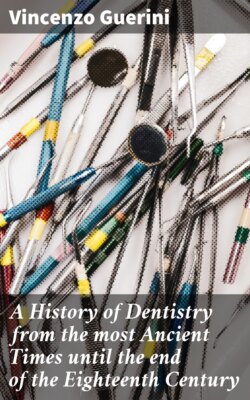Читать книгу A History of Dentistry from the most Ancient Times until the end of the Eighteenth Century - Vincenzo Guerini - Страница 9
На сайте Литреса книга снята с продажи.
CHAPTER II.
THE HEBREWS.
ОглавлениеTable of Contents
In the Hebrew literature, as principally represented by the Bible and by the Talmud, there does not exist any book on medicine. Notwithstanding the vicinity and the close relations of the Hebrews with Egypt, medical science never reached the degree of development among this people that it did in the land of the Pharaohs.
In the Bible we do not find the least trace of dental medicine or dental surgery. Indeed, although the books of Moses contain a great number of exceedingly wise hygienic precepts, there are not any that refer directly to the teeth or to the mouth. We may therefore conclude, with a certain degree of probability, that the Hebrews had in general good teeth and that dental affections were very rare among them.
The word tooth or teeth occurs in the Bible more than fifty times,23 but very few of the passages in which it is to be met with present any interest so far as our subject is concerned.
That the Hebrews attached great importance to the integrity of the dental apparatus is plainly seen from the following verses of the book of Exodus (xxi: 23 to 27):
23 … thou shalt give life for life,
24. Eye for eye, tooth for tooth, hand for hand, foot for foot,
25. Burning for burning, wound for wound, stripe for stripe.
26. And if a man smite the eye of his servant, or the eye of his maid, that it perish; he shall let him go free for his eye’s sake.
27. And if he smite out his manservant’s tooth or his maidservant’s tooth; he shall let him go free for his tooth’s sake.
These legislative measures show clearly enough that among the Hebrews the loss of a tooth was considered a lesion of great gravity, as they thought it of sufficient importance to be named in the same category as the loss of an eye, of a hand, or of a foot. If anyone caused the loss of an eye or of a tooth to his servant, the punishment was the same in both cases; that is, he was obliged to give him his liberty, thus undergoing the loss of his purchase money.
Beauty and whiteness of the teeth were also in great repute. Thus we read in the Song of Solomon (iv: 2):
“Thy teeth are like a flock of sheep that are even shorn, which came up from the washing; whereof every one bear twins, and none is barren among them.”
In another part of the Song (vi: 6) he repeats these same words, thus giving it to be understood how great was his admiration for the beautiful teeth of his beloved.
From various passages of the Bible, one perceives that integrity and soundness of the teeth was considered a prime element of force and vigor. In Psalm iii: 7 David says: “Arise, O Lord; save me, O my God: for thou hast smitten all mine enemies upon the cheek bone; thou hast broken the teeth of the ungodly.” (That is, reduced them to impotence.) And in Psalm viii: 6 we read: “Break their teeth, O God, in their mouth.”
On the other hand, in one of the Proverbs of Solomon (xxv: 19), broken or decayed teeth are taken to symbolize weakness: “Confidence in an unfaithful man in time of trouble is like a broken tooth, and a foot out of joint.” (In the Latin translation, instead of “broken tooth” stands “dens putridus.” Perhaps the corresponding expression in the Hebrew language, signifies in a general sense a decayed or injured tooth.)
The uncomfortable sensation produced on the teeth by acid substances (teeth on edge) is to be found several times alluded to in the Bible. In the Book of Proverbs (x: 26), one reads: “As vinegar to the teeth, and as smoke to the eyes, so is the sluggard to them that send him.” And Jeremiah says (xxxi: 29, 30): “In those days they shall say no more, The fathers have eaten a sour grape, and the children’s teeth are set on edge. But every one shall die for his own iniquity; every man that eateth the sour grape, his teeth shall be set on edge.”
As is apparent, there is nothing in the passages quoted that can be in any way connected with the treatment of dental affections; neither is it to be wondered at, when one reflects that even in the Talmud—which is much less ancient—medicine in general is hardly at all spoken of. This famous code as to practical life is almost silent with regard to therapeutic medicine, and only recommends hygienic practices. An axiom of the Rabbi Banaah is worthy of note, and may be quoted here as bearing on the subject, and also because many Christians might be found to conform willingly thereto:
“Wine is the best of all remedies; and it is in places where wine is wanting that one is in need of pharmaceutic remedies.”24
